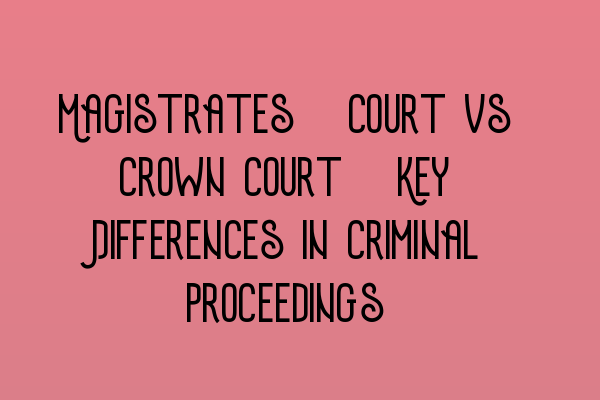Magistrates’ Court vs Crown Court: Key Differences in Criminal Proceedings
Welcome to the SQE Criminal Law & Practice Law UK blog! In this article, we will explore the key differences between Magistrates’ Court and Crown Court in criminal proceedings. Understanding these distinctions is essential for any aspiring lawyer or legal professional. So, let’s dive in!
The Role of Magistrates’ Court
Magistrates’ Court, also known as the “lower court,” is the first point of entry in most criminal cases. It deals with less serious offenses such as minor assaults, theft, and driving offenses. Magistrates, who are volunteers and not legally qualified judges, preside over the cases. A panel of three magistrates or a single district judge will hear the cases.
Magistrates’ Court offers a more informal setting compared to Crown Court. The decision-making process is based on summary judgment, meaning there is no jury present. However, defendants have the option to request a trial by jury in certain cases where the offense carries a higher maximum penalty. The court also has limited sentencing powers, generally up to six months imprisonment or fines up to a specific maximum limit.
The Role of Crown Court
Crown Court, on the other hand, deals with more serious criminal cases. These may include murder, rape, complex fraud, and other indictable offenses. The cases that start in Magistrates’ Court but are deemed too serious for summary trial are referred to Crown Court for further proceedings. Crown Court is presided over by experienced judges, and a jury of twelve individuals is responsible for reaching a verdict.
The Crown Court provides a formal setting for legal proceedings and offers more extensive sentencing powers compared to Magistrates’ Court. The judges have the authority to impose longer prison sentences and higher fines based on the severity of the offense. Additionally, Crown Court offers greater procedural flexibility for the presentation of evidence and cross-examination of witnesses.
Key Differences
1. Jurisdiction and Severity of Cases:
Magistrates’ Court primarily deals with summary offenses (less serious crimes) and has limited sentencing powers. Crown Court, on the other hand, handles more serious indictable offenses and has broader sentencing powers.
2. Trial Procedure:
Magistrates’ Court is known for its summary trial procedure, where the decision is made by a panel of magistrates or a district judge. Crown Court, however, follows an indictable trial procedure where a jury is responsible for determining the verdict based on the evidence presented.
3. Sentencing:
The sentencing powers of Magistrates’ Court are limited compared to Crown Court. Magistrates can impose fines or custodial sentences up to a certain maximum limit. Crown Court judges have wider discretion and can hand down longer prison sentences and higher fines based on the gravity of the offense.
4. Formality:
Magistrates’ Court provides a more informal setting for the proceedings, while Crown Court follows a formal setting with strict procedural rules.
5. Appeals:
In Magistrates’ Court, both the prosecution and defense have the right to appeal against a decision. Appeals from Magistrates’ Court go to Crown Court. In Crown Court, appeals can be made to the Court of Appeal Criminal Division or, in certain cases, the Supreme Court of the United Kingdom.
Conclusion
Understanding the key differences between Magistrates’ Court and Crown Court is crucial in comprehending the criminal justice system in the UK. Magistrates’ Court serves as the entry point for less serious offenses, offering a more informal environment and limited sentencing powers. Crown Court, on the other hand, handles more serious offenses, follows a formal trial procedure with a jury, and has wider sentencing powers.
To prepare for your legal career, make sure to check out our related articles:
- SQE 1 Practice Exam Questions
- SQE 1 Practice Mocks FLK1 FLK2
- SQE 2 Preparation Courses
- SQE 1 Preparation Courses
- SRA SQE Exam Dates
We hope this article provided useful insights into the distinctions between Magistrates’ Court and Crown Court. For more legal resources and information, stay tuned to our blog!
